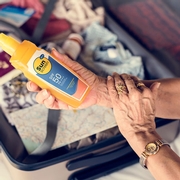Information you need to live a happy, worry-free retirement!
Are You Missing This Vulnerable Area When Applying Sunscreen?

Just in time for Skin Cancer Awareness Month this May, new research reveals there’s a body part people are missing when applying sun moisturizers with SPF.
The study, published in the PLOS One online journal in early April 2019, revealed that participants consistently missed applying SPF-containing moisturizer to their eyelids, skipping 20% of the region on average. When researchers handed participants sunscreen rather than moisturizer with SPF, people missed 14% of the area.
Why Eyelids Are So Vulnerable
Skimping on eyelids was of particular concern because skin cancers most commonly occur on the head and neck, with eyelids having the highest incidence of the disease, the researchers wrote. The skin on your eyelids is the thinnest on the body, making it more vulnerable to the sun’s ultraviolet rays. Skin cancer is common in general, and the eyelid is a common place that skin cancer occurs.
Most eyelid cancers are the basal cell skin cancer type, which grows slowly and rarely spreads to other parts of the body. But treating it early is important because it can grow wide and deep, destroying skin, tissue and bone. Eyelid cancer is diagnosed most often in adults between 50 and 80 years of age who have fair skin, according to cancer.net.
Apply It Right
Austin McCormick, lead author of the study and an eyelid surgeon at Liverpool's Aintree University Hospital, told NPR that one possible reason people skimped on the eye area is that participants wanted to avoid the stinging feeling that can occur when the lotion gets in your eyes.
But Andrea Kossler, director of Oculoplastic Surgery and Orbital Oncology at Stanford University, said in the NPR story that people should be placed right up to the eyelid margin. Chemical sunscreens that protect the skin by converting UV rays to heat can sting, but Kossler said physical sunscreens that block out the sun with minerals like zinc or titanium dioxide won't usually irritate the eyes.
For more information on protecting your eyes from skin cancer, visit www.skincancer.org. For more skin cancer prevention tips, check out this infographic.



